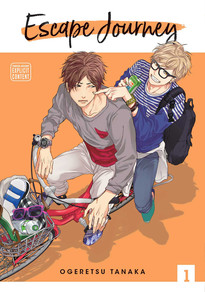Review
by Rebecca Silverman,Escape Journey
GN 1
| Synopsis: |  |
||
Taichi and Naoto went from friends to lovers in high school before everything soured, and Naoto has spent the ensuing years trying to forget his erstwhile boyfriend. He's all ready to reinvent himself in college, but his plans are abruptly foiled when he realizes that Taichi is at his same university, and even in the same major. As the two fall back into friendship, Naoto tries to reconcile the emotions he still feels for Taichi while struggling not to get hurt again. Is there any hope for a couple who just seem to keep hurting each other? |
|||
| Review: | |||
Escape Journey is one of those BL manga that struggles to hit a note between “romantic” and “kind of upsetting.” It's the story of a relationship that could be termed unhealthy from some points of view, and like many of what are known as “Old Skool” romances, consent isn't always a given. If that's your flavor of romance in general and BL in particular, Ogretsu Tanaka's English-language debut is a good example, but if you prefer your BL on the sweeter side, this may not be the book for you. The story follows Naoto and Taichi, two college first-years who were boyfriends back in high school. After a painful and very acrimonious break-up, Naoto has done his best to distance himself from the memories of the boy who was his first serious relationship, and he's looking forward to starting afresh in college, which, in his mind, will also involve dating girls. (There's a pretty strong implication that he's bi.) He's dealt a major blow when he suddenly comes face-to-face with Taichi on his first day – the two have made friends with different members of the same friend group, and Naoto can't quite figure out what to do. He certainly doesn't want to admit that Taichi's his ex, not so much because they're both guys (the story is nicely and largely devoid of homophobia), but because then he'd have to admit to himself how important the relationship was. For his part, Taichi immediately latches back on to Naoto as a friend, with many signals that he really wants to be something more. At first Naoto does his best to ignore Taichi's overtures, but before long the two fall back into a sexual relationship, one that Taichi is in no way going to let Naoto slip out of. To say that Naoto is conflicted would be understating the matter; while he's very into Taichi sexually, he can't banish his fear that things are simply going to end badly once again, leaving him in even worse shape than the last time. His mantra is that things are fine when they're just friends, but they're bad at being lovers. As the book goes on, Naoto is able to clarify that into the fact that he doesn't see a traditional happy ending for them – as two men, they're not allowed to marry (as of this writing), and thus the next step that a man and a woman would be able to take, that of becoming family, is closed to them. In this way, the story isn't just about Naoto allowing himself to love Taichi again (or to admit that he never stopped), but to understand that he doesn't need to be bound by the same standards that say that all people who truly love each other must eventually be married. To say that this is a heteronormative issue would be a bit disingenuous; while it's certainly the issue here, it isn't something only true for homosexual couples, and Naoto's struggles can be relatable to people in a variety of situations who simply don't see or want marriage as their relationship end goal. The problems arise from the fact that Naoto and Taichi do not have what could be termed a healthy relationship. In part this is because they're not able to be honest with their feelings and are carrying a lot of baggage from their initial break-up in high school, and that does seem like something they can eventually work through. But there are other markers of both emotional and physical abuse here. Taichi is incredibly jealous and takes out his frustrations physically, culminating in a rape scene towards the end of the book. We could also take the initial sex scene as nonconsensual because Naoto is drunk; even without that, however, Taichi rarely listens when Naoto expresses discomfort and does hit him at one point. In the Old Skool style, we're meant to take this as Taichi being unable to express his deep and abiding love for Naoto any other way, and as a subgenre of romance, that's literarily valid. It can, however, be very uncomfortable if that's not your thing, and to that end, there are definitely elements that the sweeter aspects can't quite make up for. Tanaka's clearly working towards something with this story, and her end point as a creator is a nice one. The art is sharp (and I don't just mean Taichi's fangs) and largely easy to follow, with the “escape” theme carrying through on the splash pages of the guys on a bicycle and a flashback to how the relationship really got started in high school. It definitely isn't a romance for everyone, but Tanaka works well with what she has, and if the journey doesn't always feel worth it, the ending certainly is. |
| Grade: | |||
|
Overall : B-
Story : B-
Art : B
+ Nice resolution, attractive art, and good use of “escape” theme. |
|||
| Production Info: | ||
|
Full encyclopedia details about Release information about |
||